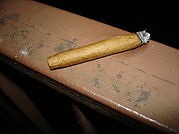- Cigarillo
-
A cigarillo (Spanish for "little cigar", pronounced [θiɣaˈɾiʎo]) is a short, narrow cigar. Unlike cigarettes, cigarillos are wrapped not in paper but in whole-leaf tobacco. Cigarillos can be found for purchase alone or in packs, and are often made without filters. Unlike a cigarette, they are not meant to be inhaled but rather smoked like a cigar.
Generally, a cigarillo contains about 3 grams of tobacco, the length varies from 3 to 4 in. and the diameter is about 5 to 8 mm. Comparatively, a cigarette contains less than 1 gram of tobacco[1] and is less than 5" in length and 10 mm in diameter.
Cigarillos are often machine made. This allows the price to be lower than if they were hand made. As cigarillos are often smoked in quantities similar to cigarettes (between 5 and 10 per day), it is not usually necessary to store them in humidors.
Cigarillos are also known in Europe as a 'Seven Minute Cigar'. This because they can be smoked in seven minutes and are often seen as an alternative not only to cigarettes but also where someone does not have enough time to smoke a full cigar.
To improve their image, cigarillos can often be found in ornately designed tins. Manufacturers explain this offers more protection for the product against crushing. This may also be explained as more efficient way of targeted advertising.
In the United States popular consumer brands include Swisher Sweets, Black and Mild, Al Capone, White Owl, Backwoods Smokes, Optimo, and Winchester, while in the United Kingdom they include Hamlets and Café Crème. Inexpensive cigarillos are often identified using a brand name rather than the term cigarillo.
Contents
Health concerns
As is the case with other tobacco products, cigarillos are a health risk to those who smoke them. In Europe, Canada and Australia they are subject to the same laws which require manufacturers to place a health warning on a portion of each package.
Like cigars, cigarillos are not meant to be inhaled. As a result of this, it is often assumed that cigarillos are a healthier alternative to cigarettes, but health authorities around the world still warn smokers of the risk they pose due to smoke being in the mouth.
Taxation
In the United States, cigarillos (and cigars) were taxed at a lower rate than cigarettes. The federal tax on cigarettes was 50 cents a pack whereas cigarillos were 5 cents per pack of 20. Large cigars had a federal tax of 5 cents maximum per cigar.[2] The difference in tax rates was credited for a 240% increase in the popularity of cigarillos over ten years. In February 2009 an increase from 5 cents to 40 cents per pack as part of the SCHIP expansion bill set a tax rate similar to that for cigarettes.[3]
Alternate usage
In Spanish-speaking countries, as well as in the Philippines, "cigarrillo" is a cigarette. In the Philippines, it is often spelt sigarílyo. Short, narrow cigars are referred to instead as little cigars. Cigarillos also can be used for smoking cannabis. The cannabis is hand wrapped into the whole leaf paper.
In English, the two l's are pronounced, although in Spanish-influenced locales, such as California, the l's become the 'y' sound.
See also
- Health effects of tobacco
- Smoking culture
References
- ^ http://www.cancer.gov/cancertopics/factsheet/Tobacco/cigars
- ^ http://www.cancer.org/docroot/PED/content/PED_10_2X_Cigar_Smoking.asp?sitearea=PED&viewmode=print&
- ^ "Health Groups Hail Increase in Federal Tobacco Taxes". National Cancer Institute. 2009-02-10. http://www.cancer.gov/ncicancerbulletin/021009/page2.
Categories:- Cigars
- Tobacciana
Wikimedia Foundation. 2010.

